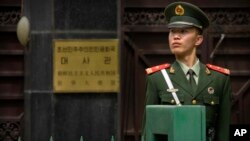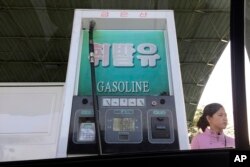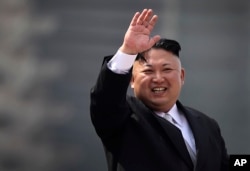One of the key messages that came out of President Donald Trump’s meeting with U.S. lawmakers on North Korea was a renewed emphasis on the need to use sanctions and diplomacy to try and pressure Pyongyang back to the negotiating table.
And while the outlook for the resumption of talks remains bleak at best, analysts say, China’s support in that effort is key. How far Beijing is prepared to go to tighten the screws and support that effort is a big question.
Further energy cuts?
Analysts in China say the government is already doing all it can to keep the North in check. China cut coal imports from North Korea earlier this year and has been tightening financial flows to the North.
Lu Chao, a North Korea scholar at the Liaoning Academy of Social Sciences in northeast China says all Chinese banks have stopped banking with their North Korean counterparts.
“China has imposed the harshest sanctions ever against North Korea, the effect of which may take some time to kick in, but they will be effective,” Lu says.
Over the past week, the price of gasoline has surged in North Korea and some suspect Beijing is behind the price hike.
It is not clear what caused the spike. Some analysts say North Korea could be stockpiling gas for fear that imports could soon be banned. Others say that when tensions rise, the military gets priority.
China is unlikely to take unilateral action when it comes to sanctions, analysts say. But, tighter energy restrictions, including bans on Pyongyang’s import of gasoline and other energy could be coming soon if North Korea continues to violate United Nations resolutions.
“Such a move would have a big impact on North Korea’s overall development of its nuclear weaponry, missile technology as well as its economy,” says Cai Jian, director of the Center for Korea Studies at Fudan University in Shanghai. “It will also affect the livelihood of its people. So, we have to be cautious about these harsh sanctions, which should only be imposed as a last resort."
No longer lips and teeth
China has long been seen as one of North Korea’s closest allies, ties that used to frequently be described as close as “lips and teeth,” but relations have taken a downturn since Kim Jong Un came to power.
Six-party talks on ending North Korea’s nuclear weapons program have been stalled since late 2007. And Kim Jong Un has shown little interest in returning to talks.
Since taking over, he has carried out three nuclear tests and more than a dozen missile launches. Military analysts say another nuclear test could be held soon.
Unlike his father, Kim Jong Un has not visited China. His uncle, Kim Song Thaek, who had close ties with Beijing and was an advocate of opening up the reclusive country’s economy, was executed in late 2013.
Earlier this month, China tried to send its nuclear envoy, Wu Dawei, to North Korea, but that overture was rejected.
China is definitely dissatisfied with North Korea’s behavior, but it is unlikely to take any extraordinary measures, says Daniel Pinkston, northeast Asia security analyst and lecturer in international relations with Troy University in Seoul.
“As far as causing the types of strains and stress that could destabilize North Korea and lead to some revolutionary change or toppling of the government or anything like that, I just don’t see the Chinese doing that,” Pinkston says. “They’ don’t believe it is in their interest and I think they are probably right.”
Strong signals
In recent state media editorials, China has sent strong signals to its northeastern neighbor, warning that if any country risks war, they will have to assume the responsibility of history, notes Bong Young-shik, of the Yonsei University Institute for North Korean Studies in Seoul.
“That’s a very stern warning to Pyongyang, to warn Pyongyang not to engage in any outright provocations that will be perceived by the United States as North Korea has crossed the red line,” Bong says.
Many analysts have noted the shift in Beijing’s tactic, and how it has softened its criticism of Washington and gotten tougher on Pyongyang.
The impetus now is that China feels it has to deliver something to maintain its relationship with the United States, says Euan Graham, director of the International Security Program at the Lowy Institute for International Policy in Sydney, Australia.
“These editorials that we’re seeing also reflect the problem that there isn’t really a handler of the relationship on the North Korean side anymore. There’s no central person like Jang Song Thaek, who for many years was the channel,” Graham says. “So, it’s not as easy, and the Chinese, I think, have genuine frustrations.”
Brian Padden in Seoul and Joyce Huang also contributed to this report






